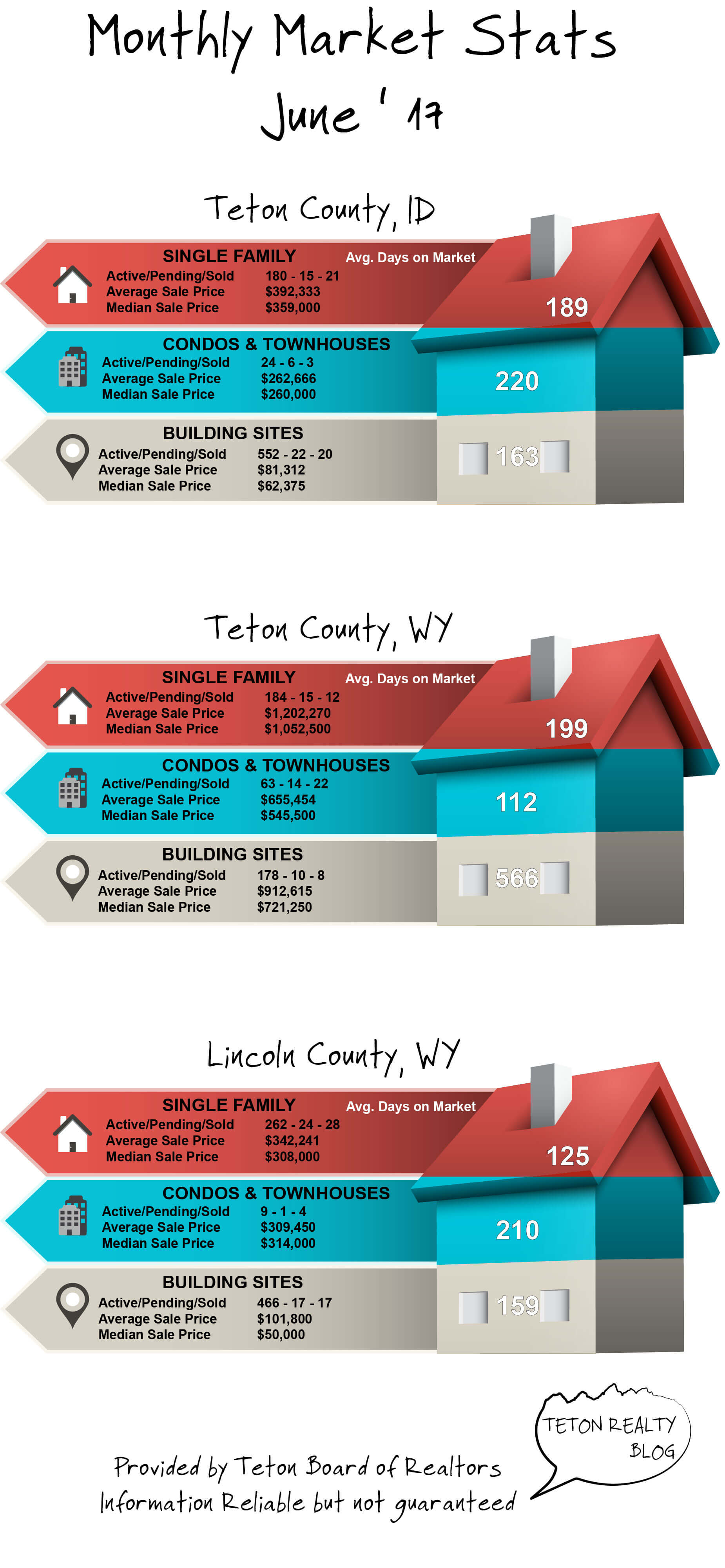Reports are coming out a bit late for Teton Valley, Jackson & Star Valley, see below:

Teton Region Real Estate Market Stats, Articles & News
Reports are coming out a bit late for Teton Valley, Jackson & Star Valley, see below:


It’s funny that I reference art in the same sentence as something that I’m not very good at. That is, the referral.
Oftentimes agents refer to the customers they are working for with different names. The one that gets me is “the client”. Agents will refer to the person they are working with as their client, regardless of whether or not the person may or may not actually be his or her client… “Oh yes, that’s Bob, he’s my client.” Sometimes I wonder if it’s a protective measure for real estate agents marking their territory when speaking to other agents about a person that might be working with either, or both…
I’ve gone way off track here. When it comes to making money in the real estate industry, we usually do so by providing a service within a State of which we are licensed. There is one exception, the referral. If I have “a client” working with me in Idaho or Wyoming, and they decide they would rather purchase in Arizona, they can do their homework and choose
an agent to work with in that State. OR, an agent the client knows or is comfortable with can vet out agents in Arizona and refer them to the agent in Arizona. When doing so, they would ask the Arizona agent for compensation in return for the referral, but usually only if the client completes the purchase in Arizona. In most cases, the agent in Arizona, or the receiving agent will compensate the broker who provided the referral a portion of the compensation they receive. It doesn’t cost the client anything.
While a referral is more accurately described as an act of referring someone for a specific service, you can now see in the real estate industry a referral often time represents a person such as a client or a customer.
So why aren’t I good at referrals? I don’t suppose it’s something that one can really be bad at, I just feel that sometimes it’s not appropriate. With regards to the
circumstance above, sure. There are however a number of agents who ask for referrals when in my opinion, it isn’t appropriate. For example, advertising real estate in an area you are not familiar with then simply referring the client to a local professional is not appropriate in most circumstances, at least in my opinion. There are unfortunately a number of brokerages whose services are dedicated to this sort of tactic. Usually a website will funnel potential buyers and sellers into a location where they receive a recommendation for an agent, even though they know nothing about the agent they are referring. In some cases the receiving agent might just be paying for the service. In this scenario, there’s no research going into the recommendation. Another example would be real estate agents themselves. Real estate agents are notorious for shopping for real estate in areas where they are not licensed, locating an agent, and asking for a referral fee when the transaction closes. I’m probably going to get some flak for this, but in many circumstances I don’t think it’s appropriate.
I believe agents need to be transparent when working with other professionals. If they expect a fee, they need to make that clear before enlisting the services of another professional.
A final note about referrals, they are ONLY paid by brokers to those with a real estate license. Agents can NOT compensate anyone directly, and Brokers can NOT compensate someone who does not hold a real estate license.
So, maybe I just need to get better about asking for a referral. Remember it’s not all about asking another agent for a fee, but it’s broaching the issue with the potential client. The referral can be a useful tool, and a helpful service to the public, as long as they are aware of the situation. I think it would be relatively difficult to refer someone to another agent without them being aware of the situation. So, how would you feel if your agent asked if they could locate another agent for you in hopes of receiving a fee from the receiving agent?
 Homeowner’s Associations and CC&R’s seem to be one of the Hot Topics in real estate, especially over the past couple of years. I don’t want to wear out the topic, but it is important to address some of the questions that people have, especially locally.
Homeowner’s Associations and CC&R’s seem to be one of the Hot Topics in real estate, especially over the past couple of years. I don’t want to wear out the topic, but it is important to address some of the questions that people have, especially locally.
For the record, I am for Homeowner’s Associations in most circumstances and agree that in some situations they don’t belong. Many people buy property within existing developments because of the covenants, rules & regulations in place. While it may not be expressly stated that the covenants are the reason for the purchase, it is usually as a result of those within a community abiding by the requirements set forth in these documents. Uniformity, style, there are a dozen reasons why these covenants makes sense.
On the flip side, there are communities in areas that have not had, and likely never will have CC&R’s or development restrictions. Usually, if it’s not within a development such as the core towns like as Driggs and Victor, it can be part of the appeal for some. I always chuckle hearing the sounds of clucking chickens in town, and seeing the great diversity in construction style in these “downtowns”, but it’s also what makes these towns charming.
So, getting back to the topic here. I’ve run into a few circumstances lately where even though I thought understood how the CC&R’s were written, I learned that many Homeowner’s Associations had interpreted these documents differently. While I think there may be an argument in many of these cases, some potential buyers don’t want to argue with the Associations regardless of whether or not they think, or anyone else thinks that they’re interpreting them incorrectly.
One of the most popular examples would be short-term rentals. Most CC&R’s do state that homes shall be used for residential purposes only. There are few exceptions that state home businesses can operate with conditional-use permits from the County, but again, most of them have this generic language. Most case law, (from what I understand many in Idaho) suggests that short-term rentals are not considered commercial businesses. Unless these documents specifically state that short-term rentals are not allowed, it is my opinion that Idaho would rule in favor of allowing rental types, both long-term and short-term.
Another example I ran into recently would be livestock and horses. The CC&R’s in this particular case stated that livestock would be allowed as long as it did not create a nuisance, but after contacting and understanding the Homeowner’s Associations interpretation, I was informed that livestock, nor horses would be allowed. I think there may be an argument here, but I’m not sure this would hold up in court. Here again, unless someone already owns the property and wants to argue, most buyers don’t want to prematurely go down this road, they would rather just find something else.
The second example might be a little bit harder to argue in the case of the association or the potential buyer, but much information I reviewed suggests that homeowners associations should specifically state what is NOT allowed as opposed to stating what is, or at least in my opinion.
As tensions rise over some of these issues in the future, I believe that homeowners association should take an active role in reviewing their CC&R’s and perhaps a mending some of the language so that it it is ambiguous while it is still relatively easy to amend these documents. Mini development today have owners of multiple lots, and very few homes in them. It’s easier to address some of these issues today as opposed to arguing with homeowners and buyers down the road, especially as population grows.
First, a special thanks to those in the community that voted for me as a “Best of Teton Valley” candidate for the real estate category. With that said, I thought this might be a good opportunity to write a special edition “Teton Realty Blog” article. As always, you can read on at tetonrealtyblog.com.

As some of you may know, I am not only a member of the Teton Board of Realtors, but also of the Snake River Regional Multiple Listing Service operated in part by the greater Idaho Falls Association of Realtors. I’m also a member of the National Association of Realtors and attend as many gatherings and educational opportunities as I can.
Having experience in marketplaces other than our local market (obviously the local market is the majority of our business) has given me the opportunity to study the dynamic of not only marketing practices, but the level of competition amongst brokers, brokerages, and real estate agents. I have also been exposed to real estate outside Teton Valley. Believe it or not, there are vast differences in not only the level of competition, but the culture. Culture of real estate you might ask? You bet there is. Those of you who have worked with a local realtor to purchase a home here after owning a home elsewhere probably know exactly what I’m talking about. If you haven’t, and you have had an experience with a local real estate agent, you probably didn’t find the experience all that unusual.
Here in Teton County, it is my opinion that we are held to a higher standard in terms of the level of service a real estate agent provides. This isn’t because we live in an area with a wealthy community over the hill, it’s because we’ve been practicing business in such a way for so long that it is now an expectation. For example, most parts of the country view listings with their respective buyer’s agent without the listing or seller’s agent present. Some areas even provide contact information for the occupant, be it a renter or the owner. The buyer’s agent might call to arrange a showing if they listings states that the property is occupied, otherwise they have a uniform lock box system, usually with an infrared access key that tracks which agent accesses the property with a date stamp. In my opinion, it’s incredibly efficient, but certainly not what we are used to here in Teton Valley. In contrast, listing or seller’s agents almost always attend showings in our marketplace. It affords the seller’s representative the opportunity to review property highlights, answer questions, and provide assurance to the occupant that lights are turned off, doors are locked and the property is secured.
“Culture” aside, I have also found the level of competitiveness to be different than most markets as well. By that, I mean more competitive. I think there are few reasons for this:
-First, not only are we a small community, but we are a recreational community. When I travel, I tend to focus on real estate advertisement. I have found the level of advertising and quality to be higher in recreational communities (which really just translate to more $$). And our little market is no exception. We have a diverse group of competing companies, and they really all do a great job. I don’t know how each of these companies pull it off, but I can tell you (whereas I handle a large portion of Teton Valley Realty’s marketing campaign) that it’s a lot of work.
-Second, we have a unique blend of box store type brokerages, big regional brokerages, and small local brokerages. In most small markets, there’s one “big guy” and perhaps a few mom and pop shops. Here, it’s very interesting to see how well each local company performs.
-Third, I think it’s just a small-town dynamic. I truly believe that some of the Region’s best (of anything) come out of Teton Valley. Honestly, it’s absolutely unbelievable how many great restaurants we have locally. Every time I travel I’m reading reviews, or checking online for a great place to eat. At the end of the day though, it’s hard to beat some of the local services that we have available in our little community. This isn’t just for restaurants either. There are great lodging opportunities, outstanding healthcare professionals, truly unique shops, a great variety of grocers, telecommunications options that would make Google proud, and the list goes on.
So why all the competition? Because we have a lot of great services to compete with!